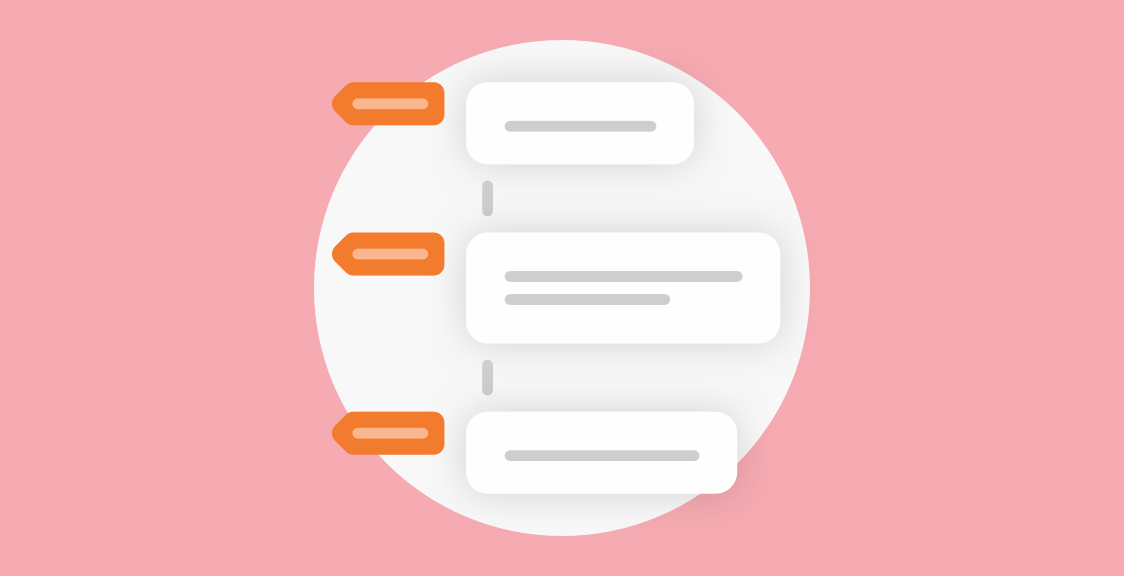In this article, we’ll cover two methods you can use to schedule recurring messages in Slack (either to yourself or to teammates):
- The first method is natively through Slack’s built-in slash commands.
- The second method is using Geekbot (our free tool), which is free for teams with 10 or fewer active users.
Note: Geekbot offers a great deal of customization and functionality, which could be well suited for your team’s needs. Click here to create a free account.
Method #1: Slack’s Built-In Slash Commands
Per this article on Slack’s blog, you can easily send recurring messages to yourself at certain dates and times using the /remind command.
Examples of slash commands include:
- /remind me to check emails at 2:30 p.m. every weekday.
- /remind me to complete a tax analysis on the 15th of every month.
- /remind me to send @jennifer an email about the status of the report in two hours.
Then, at the specified time, you’ll receive a Slackbot message about the reminder. For example:

You can also use the /remind command to schedule a recurring message to specific teammates (rather than a self-reminder).
For example, Slack’s content team uses the #team-editorial channel to run daily meetings every weekday at 9:45 a.m. using the following command:
/remind #team-editorial Hey @editorial-team What’s on today? every weekday at 9:45am

This is a great, simple method of sending recurring messages in Slack.
Method #2: Geekbot (Our Free Tool Which Integrates with Slack)

Geekbot (our free tool) lets you run asynchronous standups, retrospectives, polls, surveys (and more) inside Slack.
It offers a great deal of customization and functionality, which could be well suited for your team’s needs. We’ve helped 170,000+ users and teams within GitHub (see case study), Shopify (see case study), Zapier (see case study), and more.
A High-Level Overview: How Geekbot Works
While you could use Geekbot to schedule self-reminders in Slack, its main purpose is to help teams run quick and efficient meetings.
At a high level, with Geekbot, you:
- Decide which meeting question(s) you’d like to send in Slack. For example, you could send one question such as, “What’s your most important task for today?”, or you could send multiple questions, as in the case of a daily standup or retrospective meeting.
- Decide to which teammates you’d like to send those questions.
- Decide how often to send those questions (e.g., on a one-off basis or on a recurring schedule, such as daily, biweekly, monthly, and so on).
- Decide in which Slack channel to post the responses.
At the scheduled time, each meeting participant receives a direct message in Slack, asking them to answer the question(s). In the example below, Kate answers the standard standup questions:
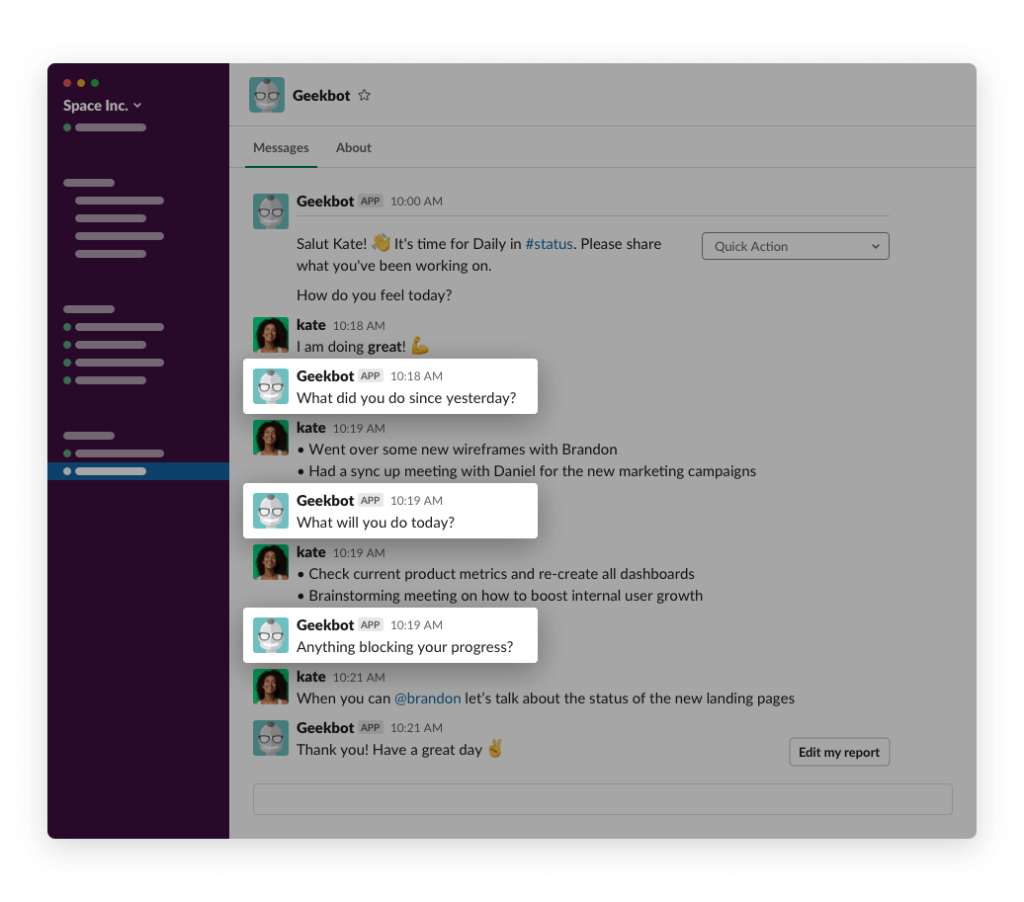
Each teammate’s response is posted in your designated Slack channel:
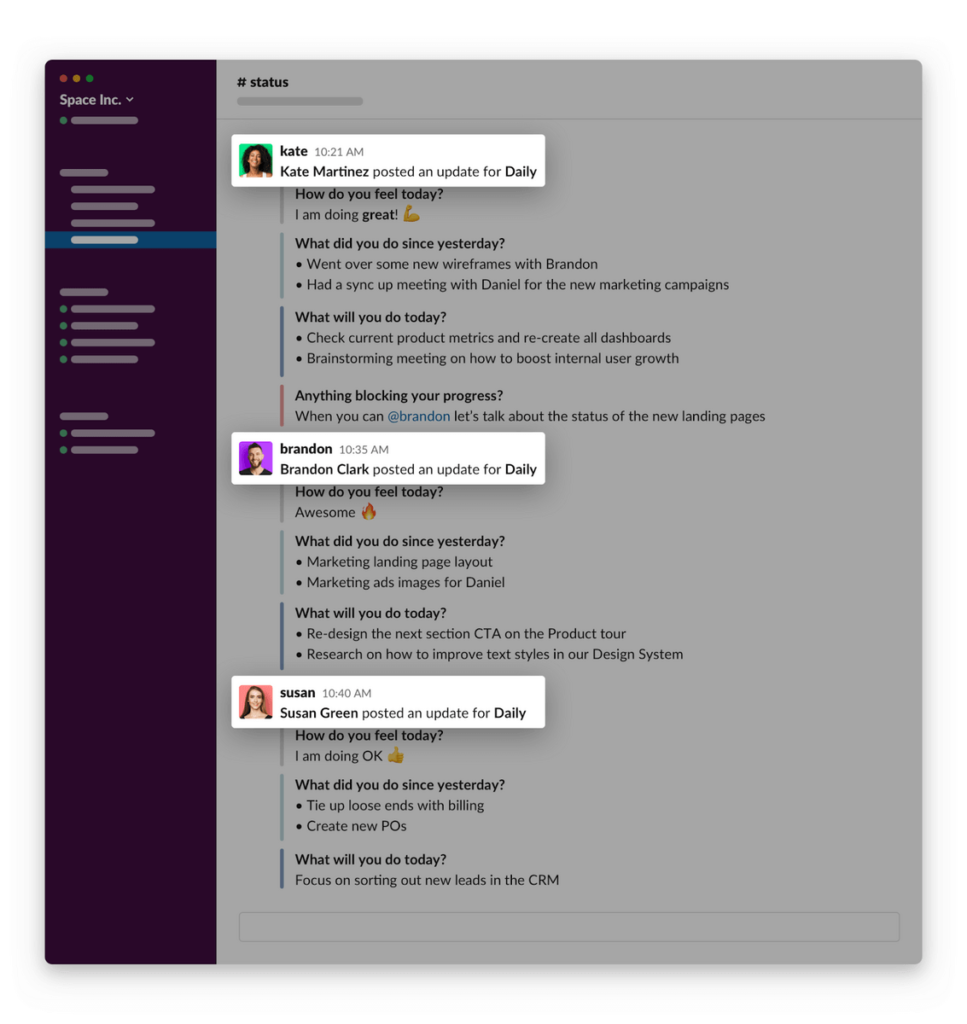
Here, teammates can skim through the responses and either complete the meeting or reply via thread (if a particular response requires their attention).
In the screenshot below, Kate tagged Brandon regarding a specific question that only pertains to them, and they resolved it via a Slack thread without interrupting other team members:

Decide Which Questions You’d Like to Send in Slack
Geekbot offers a wide variety of templates with prefilled questions. However, you can add, delete, or edit questions to your liking.
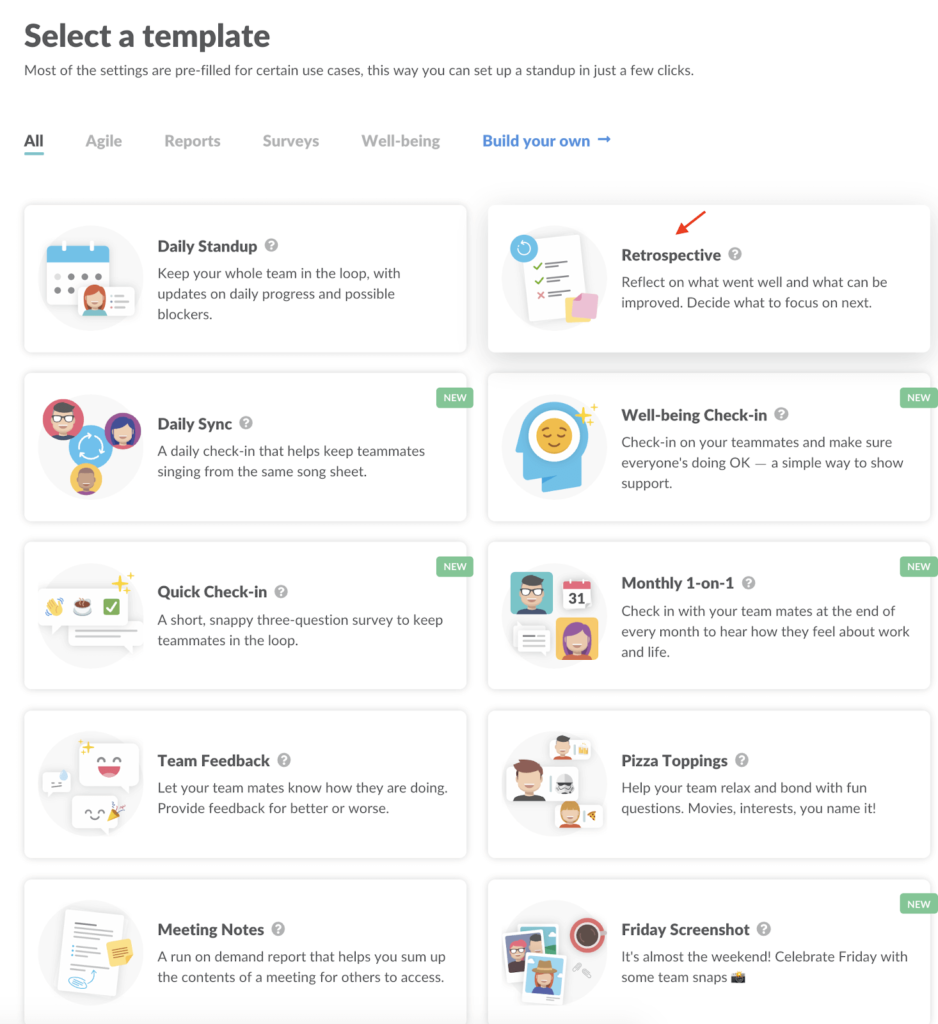
There are several templates for Scrum meetings. For example, if you select the “Retrospective” template, then Geekbot will default to these questions:
- What went well?
- What didn’t go so well?
- What have you learned?
- What still puzzles you?
There are also templates with fun team bonding questions. For example, if you select the “Pizza Toppings” template, then Geekbot will send out a random set of icebreaker questions. There are approximately 200 icebreaker questions in our dataset, including:
- What’s your favorite food?
- Coffee or tea?
- What’s your favorite book?
- And so on.
These are just two examples of templates you can choose from, and again, you can change the default questions to your liking.
Customize the Schedule
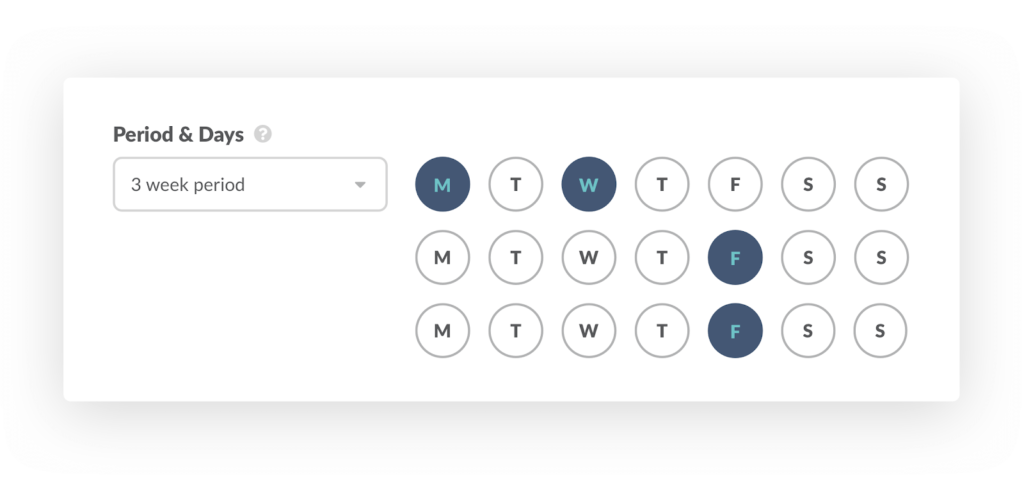
With Geekbot, you have full control over how often the questions are sent in Slack. For example, they could be sent one time only (not recurring), or, they could be sent:
- Every weekday.
- Weekly on Monday and Friday.
- Biweekly on Tuesday.
- Every three weeks on a Friday.
- First Friday of every month.
- Last Friday of every month.
- And so on.
These are just a few examples. No matter how you’d like to schedule the questions, Geekbot gives you the ability to fully customize the options.
In addition, you can schedule questions to be sent in a teammate’s local time zone:
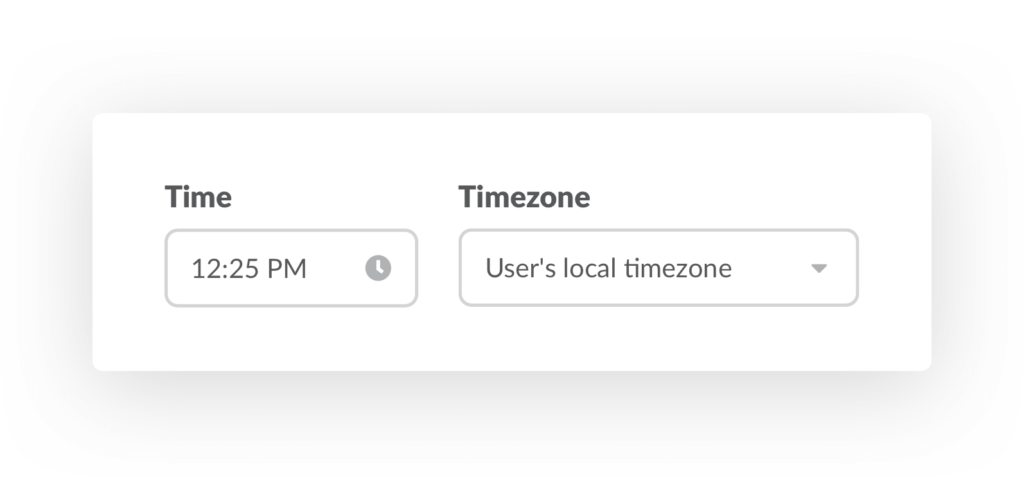
This way, no matter which geographical region someone is in (e.g., Barcelona, San Diego, Beijing), they all receive the questions at the same local time(e.g., 9:00 a.m.), rather than at a less appropriate time outside of work hours.
Optional Reminder Notifications
For the sake of example, let’s say a teammate was in the middle of a difficult coding task and entered a state of flow.
Then, they received a notification in Slack from Geekbot asking them to answer the meeting questions, but decided to save it until after they were done with their task.
However, it ended up slipping their mind, and they forgot to complete their responses. This commonly happens, especially on days with a frantic schedule.
To avoid this issue, Geekbot gives each teammatethe option toset up reminder notifications:
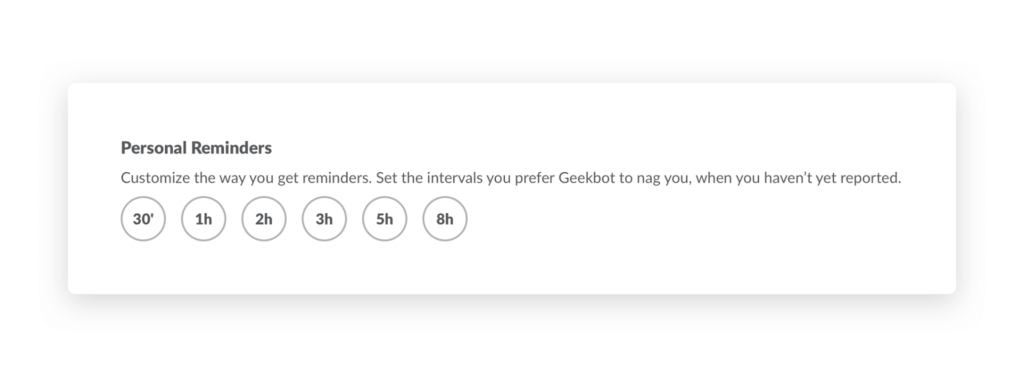
For example, if someone forgot to complete their responses within two hours, then they could configure Geekbot to send them a reminder notification in Slack.
Or, you could configure a reminder notification to be sent every 30 mins, every two hours, every five hours, and so on.
These are just a few examples, and each teammate can customize the intervals in which they receive reminders. However, again, this feature is completely optional and is turned off by default, so as to not be intrusive.
Easily Find Past Answers via Geekbot’s Dashboard
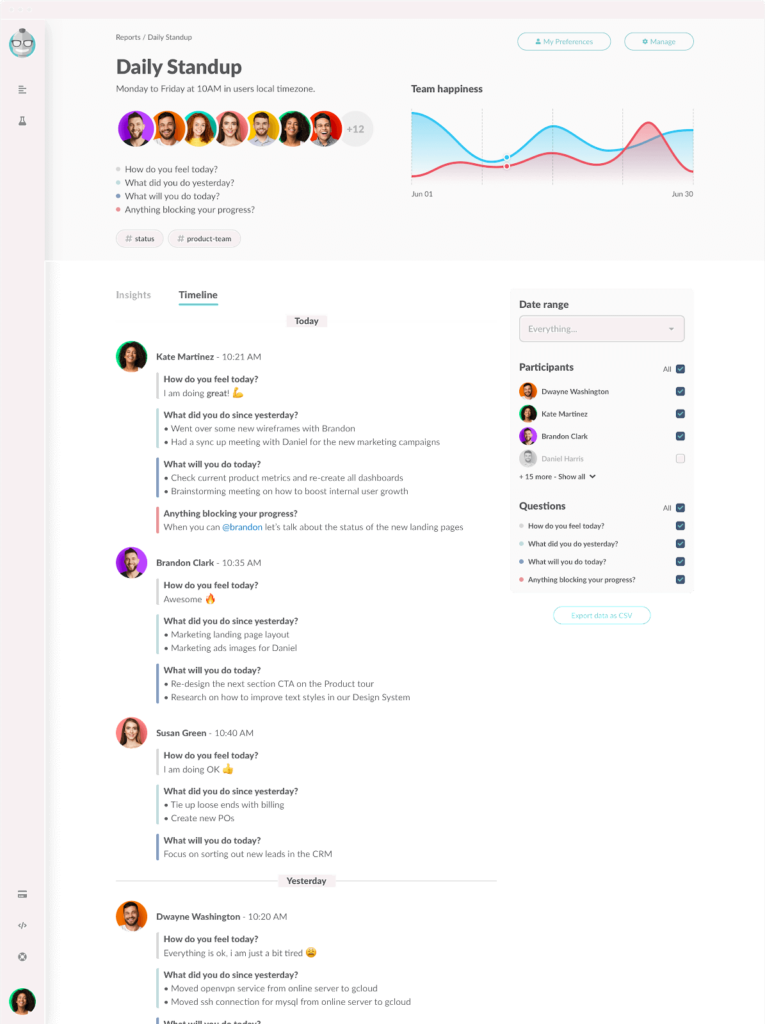
While all the answers are posted in a central Slack channel, you can also view them in Geekbot’s dashboard, which is searchable by keyword or date.
On Slack’s free plan, messages older than 90 days are hidden, so this feature is especially useful if you’d like to search for answers that are over three months old.
Geekbot’s Team Happiness Graph
If you add the question, “How do you feel today?” to your meetings, then Geekbot will analyze the sentiment of the responses, classify them as “Happy”, “Unhappy”, or “Neutral”, and map them on a graph:
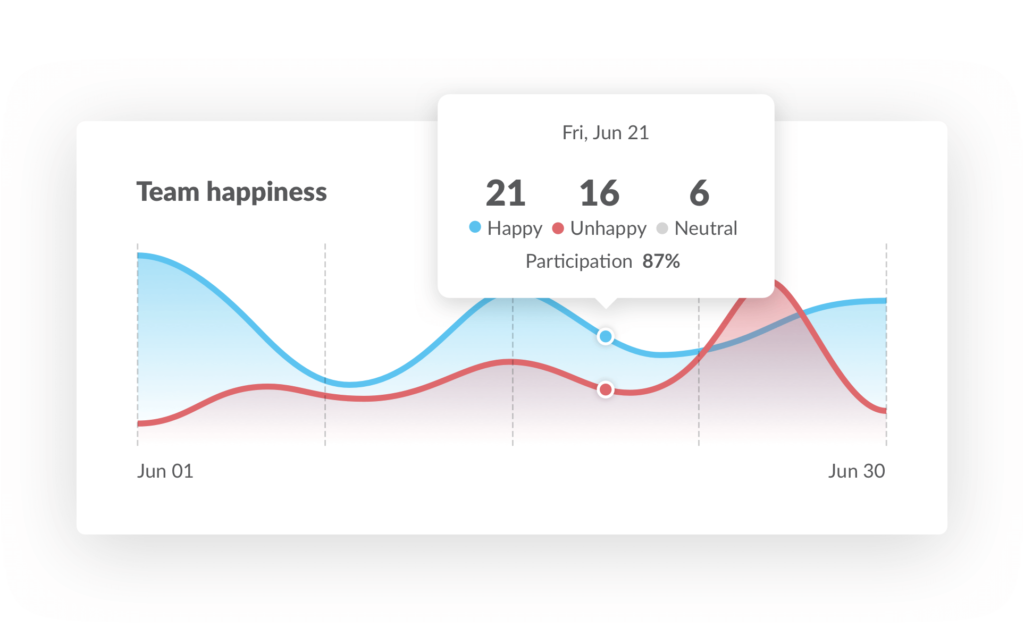
The graph is easily digestible and allows you to quickly understand the sentiment of the team.
If, for example, there’s an overwhelmingly negative sentiment, then you can identify the issue (e.g., work overload) and work to address it.
Or, if there’s a very positive sentiment, then you can also identify the reason (e.g., employees feeling appreciated) and continue or double down on what’s working.
Explore Geekbot’s Other Features and Functionality
We’ve covered just a few of Geekbot’s key features and functionality. To explore further, feel free to visit our site and view a product tour. We’re also happy to answer any questions via live chat.
Create a Free Account
Geekbot is free for teams with 10 or fewer active users. For large teams, the price is $2.50/active user/month if billed annually, or $3.00/active user/month if billed monthly.
Start a free Geekbot account here.
You may also like…
- 6 Best Slack Apps for Meetings
- 30 Slack Bots to help boost your team’s productivity
- Does Geekbot charge the whole Slack workspace?
- How to Set Up a Daily Reminder for Standups in Slack
- 9 Best Pomodoro Apps to Increase Productivity (iOS, Android, etc.)
- 9 Slack Reminder Bots to Schedule Messages and Recurring Reminders on Slack
- Geekbot’s Shortcut Commands – How to Streamline Your Workflow
- How to Manage Coworkers’ Privileges in Geekbot?
- Run Retrospectives in Your Microsoft Teams or Slack Account
Frequently asked questions
How do you schedule recurring messages on Slack?
In order to schedule recurring messages on Slack, you can either use Slack’s built-in slash commands or sign up for Geekbot (our free tool).



